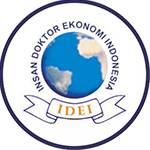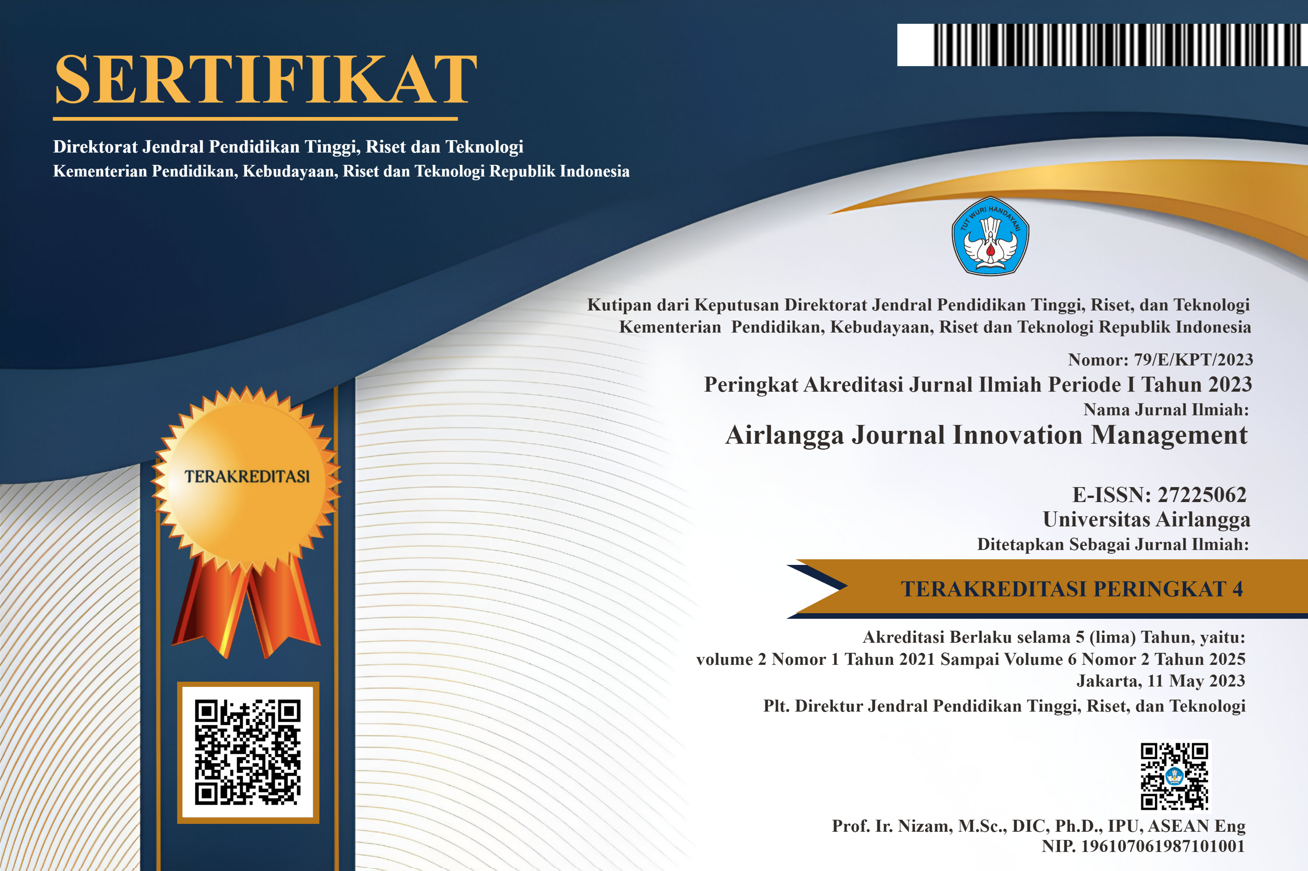Does Islamic Finance Matter for Poverty Development in Indonesia?
Downloads
Poverty remains a multifaceted economic challenge that necessitates a variety of solutions. The method that must be pursued focuses on enhancing economic, social wellbeing, and equalizing people's purchasing power to satisfy life's requirements rather than only economic growth. The purpose of this study is to discover and assess the impact of mudharabah finance, zakat, and inflation on poverty alleviation in Indonesia, both individually and collectively. The data utilized is secondary data from associated agencies such as the Financial Services Authority (OJK), the National Zakat Amil Agency (BAZNAS), Bank Indonesia (BI), and the Central Agency of Statistics (BPS) for 2006-2022 period. The study employed a multiple linear regression model and hypothesis testing utilizing E-Views 12 Software, with mudharabah funding, zakat, and inflation serving as independent factors and poverty level serving as the dependent variable. The findings of the regression tests show that mudharabah and zakat finance have a considerable negative influence on poverty, but the inflation rate has a negligible positive effect on poverty. The government, as a policymaker, can maximize the distribution of mudharabah and zakat finance for poverty alleviation initiatives; nevertheless, government must continue to pay attention to the inflation rate in order to regulate and distribute people's buying power in a balanced manner.
Ain', N. N. (2021). Pengaruh Investasi Terhadap Pertumbuhan dan Pembangunan Ekonomi. Jurnal Al-Tsaman, 3(1), 162–169.
Ascarya, A., & Sakti, A. (2022). Designing micro-fintech models for Islamic micro financial institutions in Indonesia. International Journal of Islamic and Middle Eastern Finance and Management, 15(2), 236–254. https://doi.org/10.1108/IMEFM-05-2020-0233
Balasubramanian, P., Burchi, F., & Malerba, D. (2023). Does economic growth reduce multidimensional poverty? Evidence from low- and middle-income countries. World Development, 161, 106119. https://doi.org/10.1016/j.worlddev.2022.106119
Bin-Nashwan, S. A., Abdul-Jabbar, H., Aziz, S. A., & Sarea, A. (2020). Zakah compliance in Muslim countries: an economic and socio-psychological perspective. Journal of Financial Reporting and Accounting, 19(3), 392–411. https://doi.org/10.1108/JFRA-03-2020-0057
Fadly, Inat, F., Iryanto, M., & Quilim, C. A. (2021). Analisis Pengaruh Pembiayaan Bank Syariah, Belanja Pemerintah dan Pertumbuhan Ekonomi terhadap Tingkat Kemiskinan di Kota Ternate. Jurnal Ilmiah Ekonomi Islam (JIEI), 7(1), 123–129. https://doi.org/10.29040/jiei.v7i1.1858 1.
Firmansyah, H., Anjani, A. N., Nurdianti, D., Miharja, L. N. A. D., Agustina, N., & Hariadi, H. (2022). Pengaruh Pendapatan Asli Daerah, Belanja Daerah dan Zakat Terhadap Pertumbuhan Ekonomi di Jawa Barat. El-Ecosy: Jurnal Ekonomi Dan Keuangan Islam, 2(1), 43–61. https://doi.org/https://doi.org/10.35194/eeki.v2i1.2013
Fitri, M., & Zaimsyah, A. M. (2022). Macroeconomic Factors Influence the Distribution of MSME Financing in Indonesian Islamic Banks. Airlangga Journal of Innovation Management, 3(2), 165–174. https://doi.org/10.20473/ajim.v3i1.40161
Gong, J., Wang, G., Wang, Y., & Zhao, Y. (2022). Consumption and poverty of older Chinese: 2011–2020. Journal of the Economics of Ageing, 23(September), 100410. https://doi.org/10.1016/j.jeoa.2022.100410
Hanifah, H. I., Rusmiyati, K., & Rakhmat, M. (2018). Penerapan Sistem Pembiayaan Mudharabah Terhadap Risiko Gagal Bayar di Koperasi Jasa Keuangan Syariah (KJKS) An-Nur Jatitujuh Majalengka. Maro: Jurnal Ekonomi Syariah Dan Bisnis, 1(1), 45–55.
Hany, I. H., & Islamiyati, D. (2020). Pengaruh ZIS dan Faktor Makro Ekonomi Terhadap Tingkat Kemiskinan di Indonesia. Jurnal Ekonomi, 25(1), 118–131. https://doi.org/10.24912/je.v25i1.631
Hoque, N. (2022). Promoting business zakah as a product of Islamic finance to fund social causes for well-being of the underprivileged: evidence from Bangladesh. Journal of Islamic Marketing. https://doi.org/10.1108/JIMA-10-2021-0337
Hudaefi, F. A., & Beik, I. S. (2021). Digital ZakÄh Campaign in Time of Covid-19 Pandemic in Indonesia: A Netnographic Study. Journal of Islamic Marketing, 12(3), 498–517. https://doi.org/10.1108/JIMA-09-2020-0299
Kasim, R., Engka, D. S. M., & Siwu, H. D. (2021). Analisis Pengaruh Inflasi, Pengangguran Dan Belanja Pemerintah Terhadap Kemiskinan Di Kota Manado. Jurnal EMBA: Jurnal Riset Ekonomi, Manajemen, Bisnis Dan Akuntansi, 9(1), 953–963. https://doi.org/10.35794/emba.v9i1.32645
Khalifah, M. H., Kasri, R. A., & Aslan, H. (2022). Mapping The Evolution of Zakah Theme Publications Years 1964-2021: A Bibliometric Analysis. Journal of Islamic Accounting and Business Research. https://doi.org/10.1108/JIABR-10-2021-0281
Latief, M. I., Yunus, R., Sultan, H., & Genda, A. (2022). Problematika Akselerasi Penanganan Kemiskinan Nelayan Di Masa Pandemi Covid-19 Di Kota Makassar. Jurnal Pembangunan Manusia, 3(1), 1–6. https://doi.org/10.7454/jpm.v3i1.1026
Mohd Nor, S., Abdul-Majid, M., & Esrati, S. N. (2021). The role of blockchain technology in enhancing Islamic social finance: the case of Zakah management in Malaysia. Foresight, 23(5), 509–527. https://doi.org/10.1108/FS-06-2020-0058
Morana, C. (2023). Euro area inflation and a new measure of core inflation. Research in Globalization, 7(October), 100159. https://doi.org/10.1016/j.resglo.2023.100159
Nengsih, T. A., Kurniawan, B., & Harsanti, E. F. (2021). Analisis Keterhubungan Tingkat Kemiskinan Dan Pembiayaan Syariah Di Indonesia Tahun 2005-2020. Iltizam: Journal of Shariah Economic Research, 5(2), 223–229. https://doi.org/10.30631/iltizam.v5i2.1022
Ningsih, D., & Andiny, P. (2018). Analisis Pengaruh Inflasi Dan Pertumbuhan Ekonomi Terhadap Kemiskinan Di Indonesia. Jurnal Samudra Ekonomika, 2(1), 53–61. https://doi.org/10.1234/jse.v2i1.777
Parakkasi, I. (2017). Inflasi Dalam Perspektif Islam. Laa Maisyir: Jurnal Ekonomi Islam, 4(2). https://doi.org/10.24252/lamaisyir.v4i2.4420
Priseptian, L., & Primandhana, W. P. (2022). Analisis Faktor-Faktor yang Mempengaruhi Kemiskinan di Indonesia. Forum Ekonomi: Jurnal Ekonomi, Manajemen Dan Akuntansi, 24(1), 45–53. https://doi.org/10.15408/ess.v4i2.1966
Rasyid, A. M. I., & Hannase, M. (2021). Dampak Zakat Terhadap Kesejahteraan Sosial dan Ekonomi Nasional. Jurnal Sosial Sains, 1(9), 957–967. https://doi.org/10.36418/sosains.v1i9.193
Ridlo, M., & Muthohar, A. M. (2020). Pengaruh Zakat, Pembiayaan Syariah Dan APBN Terhadap Pengentasan Kemiskinan Di Indonesia Dan Malaysia. Jurnal Dinamika Ekonomi & Bisnis, 17(2), 123–130. https://doi.org/10.34001/jdeb.v17i2.1101
Santoso, M. H. E., & Nurzaman, M. S. (2020). Asesmen Kontribusi Keuangan Syariah Terhadap Pertumbuhan Ekonomi di Indonesia. Al-Mashrafiyah: Jurnal Ekonomi, Keuangan Dan Perbankan Syariah, 4(1), 1–15. https://doi.org/https://doi.org/10.24252/al-mashrafiyah.v4i1.12304
Sarmah, P. (2022). The Vicious Cycle of Poverty Implies that Poverty is the Cause of Poverty. International Journal of Law Management & Humanities, 5(4), 794–807. https://doi.org/10.10000/IJLMH.113401
Susanto, R., & Pangesti, I. (2020). Pengaruh Inflasi dan Pertumbuhan Ekonomi Terhadap Tingkat Kemiskinan di Indonesia. Journal of Applied Business and Economics (JABE), 7(2), 271–278. https://doi.org/10.30998/jabe.v7i2.7653
Vollmer, F., & Alkire, S. (2022). Consolidating and improving the assets indicator in the global Multidimensional Poverty Index. World Development, 158, 105997. https://doi.org/10.1016/j.worlddev.2022.105997
Wahyuningsih, D., Yunaningsih, A., Priadana, M. S., Darma, D. C., & Purwadi. (2020). Why are Unemployment and Poverty Still Happening in Borneo Island, Indonesia ? International Journal of Economics and Financial Issues, 10(2), 235–241. https://doi.org/10.32479/ijefi.9214
Wooldridge, J. M. (2013). Introductory Econometrics: A Modern Approach (5th ed.). Cengage Learning.
Wulansari, U., & Hendratmi, A. (2021). the Role of Crowdfunding Based Donation Mechanism in Al-Qur'an Education Development. Airlangga Journal of Innovation Management, 2(1), 38. https://doi.org/10.20473/ajim.v2i1.26630
Zahara, J. N., & Munifatussa'idah, A. (2022). How Do Trade, Inflation, Exchange Rate, And Information Technology Influence International Tourist Visits In Indonesia? Airlangga Journal of Innovation Managements, 3(1), 1–17. https://doi.org/10.20473/ajim.v3i1.36922
Zainuri. (2022). Islamic Economic Indocator and Poverty Problem: Case Study in Indonesia. International Journal of Education and Social Science Research, 5(5), 256–268. https://doi.org/10.37500/IJESSR.2022.5514
Zakariya, N. A., & Arifin, S. (2020). Distribusi dalam Perspektif Muhammad Baqir Al-Sadr. Equilibrium: Jurnal Ekonomi Syariah, 8(1), 143. https://doi.org/10.21043/equilibrium.v8i1.6870
Copyright (c) 2023 Airlangga Journal of Innovation Management

This work is licensed under a Creative Commons Attribution-NonCommercial-ShareAlike 4.0 International License.
- The journal allows authors to hold copyright without restrictions and retain publication rights without restrictions. The author retains the copyright and grants the first publication rights to the journal, with his work simultaneously licensed under the Creative Commons Attribution-NonCommercial-ShareAlike 4.0 International License (CC BY-NC-SA). This license allows others to share the work with acknowledgment of authorship and initial publication in this journal, provided that the work is not used for commercial purposes and that any derivative works must use the same license.
- Authors may enter into additional contractual agreements for non-exclusive distribution of the journal publication version (e.g., uploading it to an institutional repository or publishing it in book form), while still including acknowledgment of the initial publication in this journal.
- Authors are allowed and encouraged to upload their work online (e.g., in an institutional repository or personal website) before and during the submission process. This can support productive scientific exchanges as well as increase citations to published works.

AJIM by UNAIR is licensed under a Creative Commons Attribution-NonCommercial-ShareAlike 4.0 International License.





















